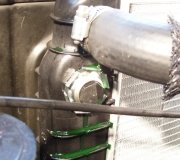Friday, February 12th, 2016 AT 10:05 AM
7 weeks ago I purchased a 1988 F. Areo Van. No check lights on. No leaks underneath. No over heating. No smoke to give me any signal something is a problem. 8 days ago ( after 40 minutes @ 60 mph I heard a pop. Pulled off freeway 10 minutes later (thought I had a flat tire) it was steaming hot white under hood. The upper radiator hose busted. Wait 3 hours van starts up. Yeah only 2 blocks. Away. Same street.A shop confirms and fixes it. Huum so I thought! The next day I phone the owner to inform still Overheating at very Short distances. Drive 15 min and coolant leaking. He stated he ll check radiator cap. Oh it'd very old and there alot of pressure here. Checks fluids change cap I'm up and out. Next day same repeat. 40 min away can't get to him. I phoned but got no where. He asking me questions like I'm a mechanic to troubleshoot. I don't know. Instructed to find a near me mechanic so I just didn't bother to go back to him yet until I can get a 2nd & 3 Rd opinion. There fore I have to fill it up with water this week drive 40 min 55_60 mph wait 2 hours in car ( I just do it I'm sure it doesn't take 2 hours at all- being safe - loosing time& $) fill with water and repeat. Help. He previously stated while fixing that I had a tiny radiator lead that was so small hardly dripping that it may be the reason the hose busted initially without there being a puddle under my van. He charged$8 to put in some sealant. All I know is my van isn't running any better still overheating which makes coolant puddle after I paid him. To replace upper radiator hose NEW CAP and sealant


